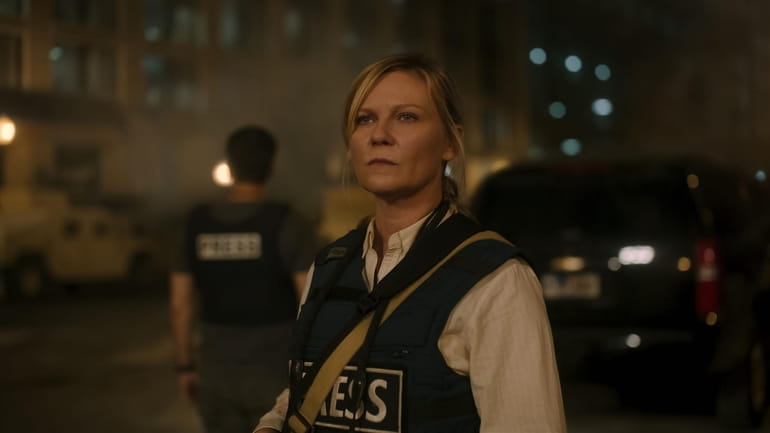'Civil War' review: Alex Garland's nightmare scenario doesn't quite hit a nerve

Kirsten Dunst in "Civil War." Credit: A24 Films
PLOT Four journalists travel through a war-torn America toward the embattled capital.
CAST Kirsten Dunst, Cailee Spaeny, Wagner Moura
RATED R (strong violence)
LENGTH 1:49
WHERE Area theaters, including IMAX
BOTTOM LINE A nightmare scenario that somehow never truly hits a nerve.
You won’t need to suspend much disbelief to buy into Alex Garland’s latest cinematic thought experiment. Bluntly titled “Civil War,” it presents an America ripped apart by politics and spiraling into lawless violence. As New York City burns, war photographer Lee (Kirsten Dunst) leads a group of journalists to the nation’s capital for the scoop of a lifetime: An interview with the besieged but widely feared President of the United States.
“Civil War” presents a near future that many Americans currently fear (and at least a few seem to welcome). Yet while this movie has the whiff of prescience, it doesn’t fully convince. With its bombed-out landscapes and depictions of man’s inhumanity to man, “Civil War” paints an evocative if familiar picture of societal collapse. What keeps the movie from truly striking a nerve is that it never answers the most urgent question: How did we get here?
Take, for instance, the President (Nick Offerman), who speaks with bombast about “the greatest victory in the history of mankind” and supposedly instructs his followers to shoot journalists on sight. But isn’t this vaguely fascist figure also a modern-day Lincoln trying preserve the Union? Speaking of which, how did Texas join California (talk about odd bedfellows) to secede under the flag of the so-called Western Forces? What do these states want? What do their citizens believe?
Perhaps writer-director Garland (“Ex Machina”), as a Brit, is loath to press any sensitive American buttons. Or maybe he’s just reluctant to alienate any box-office demographic. Either way, the unknown details of the war nag at us even during several gripping scenes of violence. Lee and her young protégé Jessie (Cailee Spaeny) snap harrowing pictures of battle — to the oddly jaunty strains of De La Soul’s “Say No Go” — while the cocky reporter Joel (an excellent Wagner Moura) admits he’s mostly in it for the rush. A mournful voice of wisdom comes from Sammy (Stephen McKinley Henderson), an aging journo working “for what’s left of The New York Times,” as Joel sneeringly puts it. But what's at stake in this war? What happens if one side wins?
The obvious model here is Francis Ford Coppola’s “Apocalypse Now,” from its overall journey motif (with highways replacing the river) to its vignettes of local insanity (Jesse Plemons plays a rogue soldier eager to add anyone to a mass grave). Coppola’s movie was about the absurdity of a real war; Garland’s is about the absurdity of a fictional one. “Someone’s trying to kill us,” a uniformed sniper says simply. “We are trying to kill them.”
In the end, Garland settles for a villain everyone can agree on: The media. His final note of cynical humor about journalists and their lust for a bloody story feels off-topic and too easy. “Civil War” may be ripped from the headlines, but if it’s nightmare scenarios you want, look no further than the headlines themselves.
OTHER CRITICS WEIGH IN
Here's what other critics are saying about “Civil War”:
The raw, up-close footage is so immersive that, in the moment, I bought it. — Minneapolis Star Tribune
In this splashy, provocative yarn about photojournalists on the front lines of an imaginary war, Garland declines to share any trenchant insights he might have on the nuances of American politics. — Tribune News Service
Smart, compelling and challenging blockbusters don’t come along that often, though this past year has had a relative embarrassment of riches with the likes of “Dune: Part Two” and “Oppenheimer.” “Civil War” should be part of that conversation too. — Associated Press
Though “Civil War” is told with blockbuster oomph, it often feels as frustratingly elliptical as a much smaller movie. Even so, I left the theater quite exhilarated. — The Atlantic
The film’s execution, hampered by thin characterization, a lackluster narrative, and an overreliance on spectacle over substance, left me disengaged. — Deadline Hollywood

